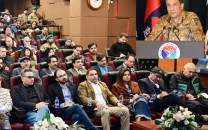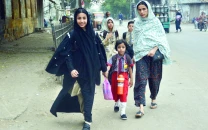Emerging India-Israel nexus in Balochistan
Sardars enjoyed extraordinary autonomy in their areas of influence

Feudal nomadic Baloch society is still struggling to fully integrate itself in political structure of Pakistani state. Being a frontier region for British India, administration of Balochistan was mostly franchised to tribal sardars, allowing central government to direct resources to other priority needs. After independence, perpetual political instability consumed Pakistan's rulers in political matters in country's heartland. As a result, central government continued with pre-partition policy of managing Balochistan through sardars who were kept under control through regular payouts and quasi suzerainty in their fiefdoms. Whenever any sardar attempted to step out of state's fold, the state re-asserted its authority by employing force while simultaneously playing feudals against each other.
While sardars enjoyed extraordinary autonomy in their areas of influence, had final say in administrative matters and received regular payouts from government in name of royalties, bogey of exploitation was kept alive as leverage against state. And the result has been numerous area specific insurgencies since independence.
However, the ongoing militancy in the province is unique in character, as its control has moved from traditional sardars to middle class militant leaders with no feudal or political background. This phenomenon is a consequence of state's refusal to negotiate with recalcitrant sardars as practiced in past, and decision to assert its authority permanently like in other settled regions of the country. Displacement of feudal authority led to vacuum which was filled by new leadership, outside of traditional feudal fold. Whatever their initial motivations, external patronisation led this group to choose militancy instead of adopting a coherent political strategy to attain their goals.
Right after the onset of the current unrest in Balochistan, India hijacked militant movement to exploit this Achilles heel of its archrival. Indian support to armed groups like BLA and BLF is well documented. Pakistan has many a time shared dossiers containing evidence of Indian support to militants with Indian government, the UN and major world capitals. In 2016, the arrest of Indian RAW officer Kulbhushan Jadhav, a serving Naval Commander level officer working on an intelligence assignment, from Pakistan provided irrefutable evidence of India's covert operations in Balochistan. Jadhav confessed to collaborating with terrorist groups, as tasked by RAW, to incite Baloch youth against Pakistani state. This is an unprecedented case of state sponsorship of terrorism, where a serving intelligence officer of India was on a clandestine mission inside Pakistan.
Lately, Israel has also jumped into the fray. Israel is long believed to have supported separatist/militant movements in Iran including those in Sistan-Baluchestan province. Iranian Baluchestan adjoins Pakistan's Balochistan province. Since harsh terrain facilitates militants to move across border undetected, dual-prong approach can deliver optimal effects. There is also an obvious convergence of interest between India and Israel which is likely to have catalysed pursuit of a joint strategy to target Pakistan and Iran through Baloch inhabited regions.
Israel's interest in destabilising Pakistani Balochistan likely stems out of a number of drivers which can include pressurising Pakistan in response to its support to Palestinian cause, pushing it towards favourable disposition on Abraham Accords, Pakistan's nuclear capability and its clout in Muslim world. Meanwhile, India is pursuing its core interest to weaken Pakistan through any means possible and also disrupt China's BRI project. Their combined project also has the potential to deny Gwadar deep sea port to China and opening of rare earth elements for exploration by Western countries.
On 18 June 2025, Meir Masri, former Israeli Deputy Minister of Defence and a lecturer at Hebrew University of Jerusalem, tweeted that "after Iran's campaign, we may seek to dismantle Pakistan's nuclear program". Probably Israeli establishment has now concluded that route to its objective runs through Balochistan. Hence, cooperation with RAW which has a plenty of experience in handling terrorist proxies like BLA and BLF is the logical path.
On 12 June 2025, a Washington-based Israeli think tank, Middle East Media Research Institute (MEMRI), launched Balochistan Studies Project, featuring key participation from Baloch diaspora championing separatist cause. Investment in translating and analysing Urdu, Balochi, Persian and Pashto sources signals that quarters in Israel now view the Baloch region as a strategically important space with geopolitical interests.
MEMRI appointed a mysterious character Mir Yar Baloch as President of the project. On 12 May 2025, Mir Yar Baloch declared independence of Balochistan via social media and called on the UN to recognise it as an independent state. Indian media identified him as a prominent Baloch dissident advocating for independence. However, the image circulated with this identity was falsely attributed and actually depicted Mazdak Baloch, the son of another Baloch activist Naela Qadri. Haribyar Marri has also published subversive content on MEMRI's website.
Recently, some international websites and publications have sharply increased their coverage of Balochistan. While ostensibly highlighting human rights concerns, their narratives are in fact promoting an anarchist agenda. The Diplomat has published more than 25 stories on Balochistan since March this year. Narratives being pushed out by MEMRI and The Diplomat have striking resemblance. Both glorify acts of violence by BLA and other terrorist outfits, while projecting Pakistani state in extremely negative manner.
Since the beginning of this year, Baloch activists in Europe have suddenly become much more active; holding seminars, debates and rallies and interacting with various think tanks and other organisations - something which is not possible without significant clout. Their narrative intentionally sidelines ground realities in order to garner financial and political support for specific agenda. They hide facts which can question legitimacy of their claims, like: overwhelming segment of Baloch society is patriotic and sincere to Pakistan; Baloch people have always been part of federal and provincial legislatures and other governance institutions; Baloch people have always held top executive positions in the province though Pushtuns make the second largest segment of population there; special quotas in jobs and universities are reserved for Baloch; a larger share of resources in NFC award is specially allocated for Balochistan by reducing the due share of Punjab; and a large number of Baloch people are happily serving in civil bureaucracy, armed forces and paramilitary forces, even more than their demographic share while hundreds of thousands are peacefully pursuing their occupations in different parts of the country.
Misleading narratives and malafide campaigns by vested interests have blurred facts concerning Balochistan. Though state needs to play its part in addressing genuine grievances, interference by India and now Israel are there to complicate the matters.



















COMMENTS
Comments are moderated and generally will be posted if they are on-topic and not abusive.
For more information, please see our Comments FAQ